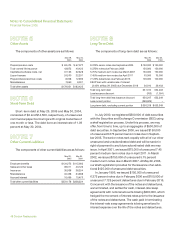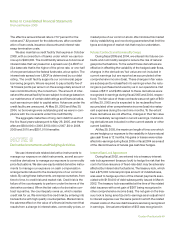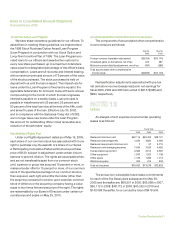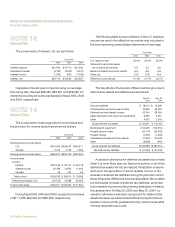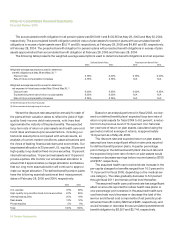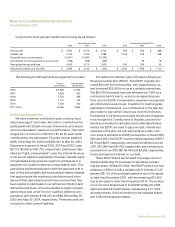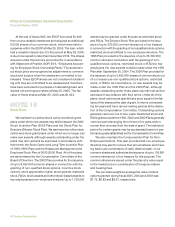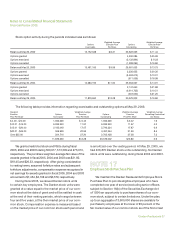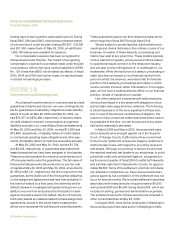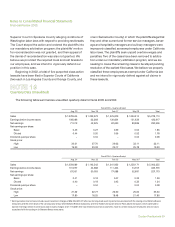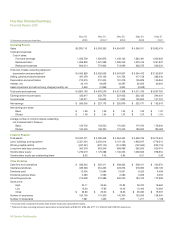Red Lobster 2005 Annual Report Download - page 50
Download and view the complete annual report
Please find page 50 of the 2005 Red Lobster annual report below. You can navigate through the pages in the report by either clicking on the pages listed below, or by using the keyword search tool below to find specific information within the annual report.Notes to Consolidated Financial Statements
Financial Review 2005
58 Darden Restaurants
trading days of each quarterly participation period. During
fiscal 2005, 2004 and 2003, employees purchased shares
of common stock under the plan totaling 266,407, 319,299
and 261,409, respectively. At May 29, 2005, an additional
1,692,748 shares were available for issuance.
No compensation expense has been recognized for
shares issued under the plan. The impact of recognizing
compensation expense for purchases made under the plan
in accordance with the fair value method specified in SFAS
No. 123 is less than $900, net of related tax effects, in fiscal
2005, 2004 and 2003 and had no impact on reported basic
or diluted net earnings per share.
NOTE 18
Commitments and Contingencies
As collateral for performance on contracts and as credit
guarantees to banks and insurers, we were contingently lia-
ble for guarantees of subsidiary obligations under standby
letters of credit. At May 29, 2005 and May 30, 2004, we
had $72,677 and $72,480, respectively, of standby letters
of credit related to workers’ compensation and general
liabilities accrued in our consolidated financial statements.
At May 29, 2005 and May 30, 2004, we had $13,829 and
$15,896, respectively, of standby letters of credit related
to contractual operating lease obligations and other pay-
ments. All standby letters of credit are renewable annually.
At May 29, 2005 and May 30, 2004, we had $1,768
and $4,346, respectively, of guarantees associated with
leased properties that have been assigned to third parties.
These amounts represent the maximum potential amount
of future payments under the guarantees. The fair value of
these potential payments discounted at our pre-tax cost
of capital at May 29, 2005 and May 30, 2004, amounted to
$1,395 and $3,131, respectively. We did not accrue for the
guarantees, as the likelihood of the third parties defaulting
on the assignment agreements was less than probable. In
the event of default by a third party, the indemnity and/or
default clauses in our assignment agreements govern our
ability to recover from and pursue the third party for dam-
ages incurred as a result of its default. We do not hold any
third-party assets as collateral related to these assignment
agreements, except to the extent that the assignment
allows us to repossess the building and personal property.
These guarantees expire over their respective lease terms,
which range from fiscal 2007 through fiscal 2012.
We are subject to private lawsuits, administrative pro-
ceedings and claims that arise in the ordinary course of our
business. A number of these lawsuits, proceedings and
claims may exist at any given time. These matters typically
involve claims from guests, employees and others related
to operational issues common to the restaurant industry,
and can also involve infringement of, or challenges to, our
trademarks. While the resolution of a lawsuit, proceeding or
claim may have an impact on our financial results for the
period in which it is resolved, we believe that the final dis-
position of the lawsuits, proceedings and claims in which
we are currently involved, either individually or in the aggre-
gate, will not have a material adverse effect on our financial
position, results of operations or liquidity.
Like other restaurant companies and retail employers,
we have been faced in a few states with allegations of pur-
ported class-wide wage and hour violations. The following
is a brief description of the more significant of these mat-
ters. In view of the inherent uncertainties of litigation, the
outcome of any unresolved matter described below cannot
be predicted at this time, nor can the amount of any poten-
tial loss be reasonably estimated.
In March 2003 and March 2002, two purported class
action lawsuits were brought against us in the Superior
Court of Orange County, California by three current and
former hourly restaurant employees alleging violations of
California labor laws with respect to providing meal and
rest breaks. Although we continue to believe we provided
the required meal and rest breaks to our employees, to avoid
potentially costly and protracted litigation, we agreed dur-
ing the second quarter of fiscal 2005 to settle both lawsuits
and a similar case filed in Sacramento County, for approxi-
mately $9,500. Terms of the settlement, which do not include
any admission of liability by us, have received preliminary
judicial approval, but completion of the settlement may not
occur for several months. We recorded settlement expenses
associated with these lawsuits of approximately $4,500
during fiscal 2005 and $5,000 during fiscal 2004, which are
included in selling, general and administrative expenses.
The settlement amounts of these lawsuits are included in
other current liabilities at May 29, 2005.
In August 2003, three former employees in Washington
filed a similar purported class action in Washington State


